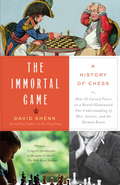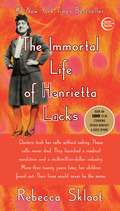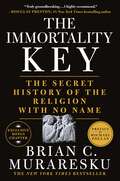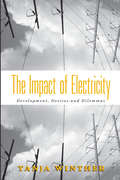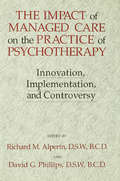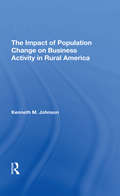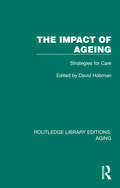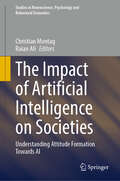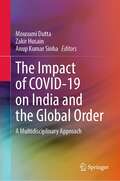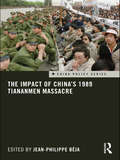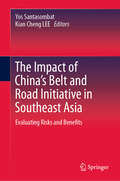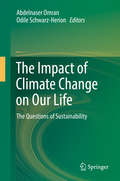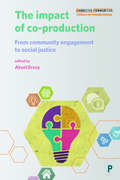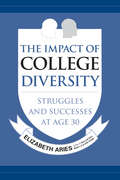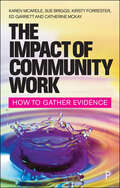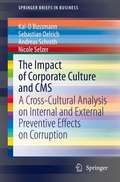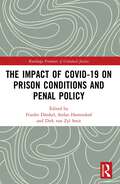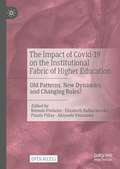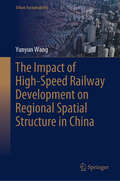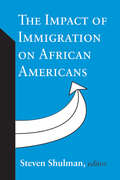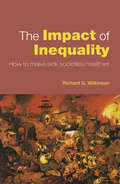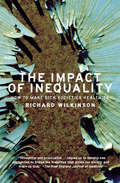- Table View
- List View
The Immortal Game: A History of Chess
by David ShenkA fresh, engaging look at how 32 carved pieces on a Chess board forever changed our understanding of war, art, science, and the human brain.Chess is the most enduring and universal game in history. Here, bestselling author David Shenk chronicles its intriguing saga, from ancient Persia to medieval Europe to the dens of Benjamin Franklin and Norman Schwarzkopf. Along the way, he examines a single legendary game that took place in London in 1851 between two masters of the time, and relays his own attempts to become as skilled as his Polish ancestor Samuel Rosenthal, a nineteenth-century champion. With its blend of cultural history and Shenk&’s lively personal narrative, The Immortal Game is a compelling guide for novices and aficionados alike.
The Immortal life of Henrietta Lacks
by Rebecca Skloot<P>Her name was Henrietta Lacks, but scientists know her as HeLa. She was a poor Southern tobacco farmer who worked the same land as her slave ancestors, yet her cells-taken without her knowledge-became one of the most important tools in medicine. <P>The first “immortal” human cells grown in culture, they are still alive today, though she has been dead for more than sixty years. If you could pile all HeLa cells ever grown onto a scale, they’d weigh more than 50 million metric tons-as much as a hundred Empire State Buildings. HeLa cells were vital for developing the polio vaccine, uncovered secrets of cancer, viruses, and the atom bomb’s effects; helped lead to important advances like in vitro fertilization, cloning, and gene mapping; and have been bought and sold by the billions. Yet Henrietta Lacks remains virtually unknown, buried in an unmarked grave. <P>Now Rebecca Skloot takes us on an extraordinary journey, from the “colored” ward of Johns Hopkins Hospital in the 1950s to stark white laboratories with freezers full of HeLa cells; from Henrietta’s small, dying hometown of Clover, Virginia-a land of wooden slave quarters, faith healings, and voodoo-to East Baltimore today, where her children and grandchildren live and struggle with the legacy of her cells. <P>Henrietta’s family did not learn of her “immortality” until more than twenty years after her death, when scientists investigating HeLa began using her husband and children in research without informed consent. And though the cells had launched a multimillion-dollar industry that sells human biological materials, her family never saw any of the profits. As Rebecca Skloot so brilliantly shows, the story of the Lacks family-past and present-is inextricably connected to the dark history of experimentation on African Americans, the birth of bioethics, and the legal battles over whether we control the stuff we are made of. <P>Over the decade it took to uncover this story, Rebecca became enmeshed in the lives of the Lacks family-especially Henrietta’s daughter Deborah, who was devastated to learn about her mother’s cells. She was consumed with questions: Had scientists cloned her mother? Did it hurt her when researchers infected her cells with viruses and shot them into space? What happened to her sister, Elsie, who died in a mental institution at the age of fifteen? And if her mother was so important to medicine, why couldn’t her children afford health insurance? <P>Intimate in feeling, astonishing in scope, and impossible to put down,The Immortal Life of Henrietta Lackscaptures the beauty and drama of scientific discovery, as well as its human consequences. <P><b>A New York Times Bestseller</b>
The Immortality Key: The Secret History of the Religion with No Name
by Brian C. MurareskuTHE NEW YORK TIMES BESTSELLER As seen on The Joe Rogan Experience! A groundbreaking dive into the role psychedelics have played in the origins of Western civilization, and the real-life quest for the Holy Grail that could shake the Church to its foundations. The most influential religious historian of the 20th century, Huston Smith, once referred to it as the "best-kept secret" in history. Did the Ancient Greeks use drugs to find God? And did the earliest Christians inherit the same, secret tradition? A profound knowledge of visionary plants, herbs and fungi passed from one generation to the next, ever since the Stone Age? There is zero archaeological evidence for the original Eucharist – the sacred wine said to guarantee life after death for those who drink the blood of Jesus. The Holy Grail and its miraculous contents have never been found. In the absence of any hard data, whatever happened at the Last Supper remains an article of faith for today’s 2.5 billion Christians. In an unprecedented search for answers, The Immortality Key examines the archaic roots of the ritual that is performed every Sunday for nearly one third of the planet. Religion and science converge to paint a radical picture of Christianity’s founding event. And after centuries of debate, to solve history’s greatest puzzle. Before the birth of Jesus, the Ancient Greeks found salvation in their own sacraments. Sacred beverages were routinely consumed as part of the so-called Ancient Mysteries – elaborate rites that led initiates to the brink of death. The best and brightest from Athens and Rome flocked to the spiritual capital of Eleusis, where a holy beer unleashed heavenly visions for two thousand years. Others drank the holy wine of Dionysus to become one with the god. In the 1970s, renegade scholars claimed this beer and wine – the original sacraments of Western civilization – were spiked with mind-altering drugs. In recent years, vindication for the disgraced theory has been quietly mounting in the laboratory. The constantly advancing fields of archaeobotany and archaeochemistry have hinted at the enduring use of hallucinogenic drinks in antiquity. And with a single dose of psilocybin, the psychopharmacologists at Johns Hopkins and NYU are now turning self-proclaimed atheists into instant believers. But the smoking gun remains elusive. If these sacraments survived for thousands of years in our remote prehistory, from the Stone Age to the Ancient Greeks, did they also survive into the age of Jesus? Was the Eucharist of the earliest Christians, in fact, a psychedelic Eucharist? With an unquenchable thirst for evidence, Muraresku takes the reader on his twelve-year global hunt for proof. He tours the ruins of Greece with its government archaeologists. He gains access to the hidden collections of the Louvre to show the continuity from pagan to Christian wine. He unravels the Ancient Greek of the New Testament with the world’s most controversial priest. He spelunks into the catacombs under the streets of Rome to decipher the lost symbols of Christianity’s oldest monuments. He breaches the secret archives of the Vatican to unearth manuscripts never before translated into English. And with leads from the archaeological chemists at UPenn and MIT, he unveils the first scientific data for the ritual use of psychedelic drugs in classical antiquity. The Immortality Key reconstructs the suppressed history of women consecrating a forbidden, drugged Eucharist that was later banned by the Church Fathers. Women who were then targeted as witches during the Inquisition, when Europe’s sacred pharmacology largely disappeared. If the scientists of today have resurrected this technology, then Christianity is in crisis. Unless it returns to its roots. Featuring a Foreword by Graham Hancock, the NYT bestselling author of America Before.
The Impact Of Electricity: Development, Desires and Dilemmas
by Tanja WintherHow does everyday life change when electricity becomes available to a group of people for the first time? Why do some groups tend to embrace this icon of development while other groups actively fight against it? This book examines the effects of electricity's arrival in an African, rural community. Based on ethnographic fieldwork in Zanzibar at different points in time, the author provides a compelling account of the social implications in question. The rhythm of life changes and life is speeding up. Sexuality and marriage patterns are affected. And a range of social relations, e.g. between generations and genders, as well as relations between human beings and spirits, become modified. Despite men and women's general appreciation of the new services electricity provides, new dilemmas emerge. By using electricity as a guide through the social landscape, the particularities of social and cultural life in this region emerge. Simultaneously, the book invites readers to understand the ways that electricity affects and becomes implicated in our everyday life.
The Impact Of Managed Care On The Practice Of Psychotherapy: Innovations, Implementation And Controversy
by Richard M. Alperin David G. PhillipsPublished in 1996, The Impact Of Managed Care On The Practice Of Psychotherapy is a valuable contribution to the field of Psychotherapy.
The Impact Of Population Change On Business Activity In Rural America
by Kenneth M JohnsonDr. Johnson moves beyond the existing literature on rural-urban population shifts during the past forty years to examine the effects of those shifts on the business infrastructure that supplies goods and services to rural areas in the United States. First establishing a historical demographic context to serve as a backdrop, he provides a detailed longitudinal treatment on the linkage between population change and the rural commercial infrastructure, as well as timely information on the impact of the recent rural population turnaround on business. Some of his findings, based on the latest data available, refute earlier expectations that a decrease in population necessarily leads to a decline in the local business community.
The Impact of Ageing: Strategies for Care (Routledge Library Editions: Aging)
by David HobmanAt the beginning of the 1980s, the previous few decades had been characterised by a ‘population explosion’ amongst the older age groups. Due to the success of medical science at prolonging life, this phenomenon had been experienced throughout both the developing and the developed world. Given the acute economic difficulties faced by the countries concerned, it was apparent that the allocation of resources, in terms of cash and care, would have to concentrate on the oldest and frailest members of the community.
The Impact of Artificial Intelligence on Societies: Understanding Attitude Formation Towards AI (Studies in Neuroscience, Psychology and Behavioral Economics)
by Christian Montag Raian AliThis book presents a recent framework proposed to understand how attitudes towards artificial intelligence are formed. It describes how the interplay between different variables, such as the modality of AI interaction, the user personality and culture, the type of AI applications (e.g. in the realm of education, medicine, transportation, among others), and the transparency and explainability of AI systems contributes to understand how user's acceptance or a negative attitude towards AI develops. Gathering chapters from leading researchers with different backgrounds, this book offers a timely snapshot on factors that will be influencing the impact of artificial intelligence on societies. Chapter 12 is available open access under a Creative Commons Attribution 4.0 International License via link.springer.com.
The Impact of COVID-19 on India and the Global Order: A Multidisciplinary Approach
by Zakir Husain Mousumi Dutta Anup Kumar SinhaThis book provides a multidisciplinary analysis of the many socio-economic challenges posed by COVID-19 pandemic across international boundaries, disrupting the economic system and life styles globally. It starts by setting the historical context of the pandemic and proceeds to describe the impact on the Indian economy, how certain sections of the population have become economically and psychologically vulnerable. International experts from diverse fields—development economics, macroeconomics, corporate finance, history, sociology, psychology, public policy, and urban studies—contribute to this exciting analysis of an Indian and global society at the crossroads. The book examines emerging themes related to global economic revival, intellectual property rights over the vaccine, and rupturing of the global supply chains. It discusses the response of institutions and markets to the global pandemic. It closes with a futuristic look at the new society and global system that may emerge out of the chaos. A valuable resource appealing to a wide readership across the social sciences and the humanities. Readers include undergraduate students, postgraduate students, researchers and academic teachers, and also public policy experts.
The Impact of Capital and Foreign Exchange Flows on the Competitiveness of Developing Countries
by Bassem Kamar Damyana Bakardzhieva Sami Ben NaceurA report from the International Monetary Fund.
The Impact of China's 1989 Tiananmen Massacre (China Policy Series)
by Jean-Philippe BéjaThe 1989 pro-democracy movement in China constituted a huge challenge to the survival of the Chinese communist state, and the efforts of the Chinese Communist party to erase the memory of the massacre testify to its importance. This consisted of six weeks of massive pro-democracy demonstrations in Beijing and over 300 other cities, led by students, who in Beijing engaged in a hunger strike which drew wide public support. Their actions provoked repression from the regime, which - after internal debate - decided to suppress the movement with force, leading to a still-unknown number of deaths in Beijing and a period of heightened repression throughout the country. This book assesses the impact of the movement, and of the ensuing repression, on the political evolution of the People’s Republic of China. The book discusses what lessons the leadership learned from the events of 1989, in particular whether these events consolidated authoritarian government or facilitated its adaptation towards a new flexibility which may, in time, lead to the transformation of the regime. It also examines the impact of 1989 on the pro-democracy movement, assessing whether its change of strategy since has consolidated the movement, or if, given it success in achieving economic growth and raising living standards, it has become increasingly irrelevant. It also examines how the repression of the movement has affected the economic policy of the Party, favoring the development of large State Enterprises and provoking an impressive social polarisation. Finally, Jean-Philippe Béja discusses how the events of 1989 are remembered and have affected China’s international relations and diplomacy; how human rights, law enforcement, policing, and liberal thought have developed over two decades.
The Impact of China's Belt and Road Initiative in Southeast Asia: Evaluating Risks and Benefits
by Yos Santasombat Kian Cheng LeeDrawing insights from intensive empirical investigation of the Belt and Road Initiative (BRI) projects in various Southeast Asian countries, this book assesses and analyzes the continuing impact of China’s BRI on Thailand and ASEAN at a critical period of Southeast Asian history. Over the past decade, the BRI, a large flagship foreign policy effort of President Xi Jinping, has had a significant economic, political, and environmental impact across the world. Since its inception, the BRI has remained shrouded in confusion and controversy. The Covid-19 pandemic also presented additional challenges for our understanding of the BRI that warrant further exploration. This volume places special focus on special economic zones (SEZs) and high-speed train projects, and comparatively examines and critically analyzes the risks and benefits stemming from these megaprojects. Breaking away from existing academic studies on the BRI, which have been largely based on macro analysis with a top-down approach and theoretical deliberation, this book focuses on local realities with a qualitative approach to identify the potential impact of the BRI on the development of ASEAN countries. By way of a bottom-up, empirically-rich, first-hand ethnographic account of the risks and benefits of the BRI projects at the local, national, and regional levels in ASEAN, this book makes a substantial contribution to multiple disciplinary arenas, from anthropology, sociology, and history, to political science and international relations, with particular relevance to those researching China and its relationships with Southeast Asia.
The Impact of Climate Change on Our Life: The Questions Of Sustainability
by Odile Schwarz-Herion Abdelnaser OmranThis book introduces the highly topical issue from many different angles, sensitizing readers to the various challenges to human life posed by climate change, identifying possible intentional and inadvertent anthropogenic factors and consequences, and seeking socially and environmentally viable solutions. The book begins by examining the impact of the climate change discussion on science, politics, economy and culture – from its historical origin in the first Club of Rome Report and its inclusion in the UN's SDGs to the Paris Agreement and beyond. Comprising 12 chapters, it analyses the factors which caused the catastrophic 2014 Kelantan flood in Malaysia, focusing on the Kuala Krai district and discusses mud architecture in Wadi Hadramout, Yemen and mitigating the expected effects of climate change on this unique architecture and cultural heritage. It also examines the economic costs of climate change on health and the increased burden on individual expenditures and national health systems. The role of climate change in the water-energy nexus and efforts to increase efficiency in energy and water end-use to increase Queensland’s agricultural sector’s resilience in Australia is addressed, as is water security and climate change issues in developing countries and the potential of partnership procurement strategies for managing sustainable urban water supply in Nigerian cities. It also includes a chapter offering a new approach to waste management, exploring to what extent waste can complicate our daily actions and influence environmental decay, and recommending that renewable materials be sorted and separated from other types of materials to avoid cross-contamination, to increase the value of the materials, and to ease the process of manufacturing. Subsequent chapters identify factors sustaining the municipal solid waste management and practices in Ajdabiya city in Libya, and look at accounting disclosure remedies by exploring areas in which sustainability reporting could expand beyond corporate environmental reporting to additional disclosures, curbing recklessness in pursuing merely economic goals. The book shows – from the perspective of agriculture – how human activities can increase the negative impacts of climate change on lifestyle in Malaysia, suggesting alternative lifestyles and encouraging international cooperative efforts. The last chapters evaluate the impacts of various environmental factors on the local tourism sector in Pakistan, and discuss strategies to tackle climate change, focusing on the opportunities and risks of climate engineering. Since these risks encompass inadvertent negative effects and targeted abuse for covert weather warfare and terrorism that violate the UN’s ENMOD convention, the author recommends viable alternatives to deal with climate change.
The Impact of Co-production: From Community Engagement to Social Justice (Connected Communities)
by Aksel ErsoyBringing together academics, artists, practitioners and ‘community activists’, this book explores the possibilities for, and tensions of, social justice work under the contemporary drive for community-orientated ‘impact’ in the academy. Threading a line between celebratory accounts of institutionalised community engagement, self-professed ‘radical’ scholarship for social change and critical accounts of the governmentalisation of community, the book makes an original contribution to all three fields of scholarship. Showcasing experimental research and co-production practices taking place in the UK, Australia, Sweden and Canada and within universities, independent research organisations and internationally prestigious museums and galleries, the book considers what research impact could look like for a wide range of audiences and how universities could engage with different publics in ways that would be relevant and useful, but may not necessarily be easily measurable. Asking hard questions of the current impact agenda, the book offers an insight into emerging routes towards co-production for social justice.
The Impact of College Diversity: Struggles and Successes at Age 30
by Elizabeth AriesIn 2005, Elizabeth Aries chronicled what 58 Amherst College freshman—Black and white, affluent and lower-income—learned from racial and class diversity. Her study emphasized the value of campus diversity at elite colleges. Four years later, Aries interviewed the same students about their diversity experiences as they graduated. Now, eight years later, she re-interviews her participants to see how and to what extent race and class continue to play a role as they move into adulthood. The Impact of College Diversity details how exposure to diversity in college helped shape Black and white graduates process issues of economic and racial privilege and inequality at age 30. She investigates how college diversity experiences also facilitate the attainment of upward social mobility in lower-income students and the role that mobility played in their relationships with family and friends in their home communities. Aries further examines how interactions with peers of another race and class influenced development of citizenship skills and civic engagement, as well as Black students’ ability to cope with the challenges they faced in the professional world. Aries concludes her study with a discussion of why elite colleges have been beneficial in promoting upward mobility in lower-income students, and the importance of achieving equity and inclusion in making diversity initiatives successful.
The Impact of College Diversity: Struggles and Successes at Age 30
by Elizabeth AriesIn 2005, Elizabeth Aries chronicled what 58 Amherst College freshman—Black and white, affluent and lower-income—learned from racial and class diversity. Her study emphasized the value of campus diversity at elite colleges. Four years later, Aries interviewed the same students about their diversity experiences as they graduated. Now, eight years later, she re-interviews her participants to see how and to what extent race and class continue to play a role as they move into adulthood. The Impact of College Diversity details how exposure to diversity in college helped shape Black and white graduates process issues of economic and racial privilege and inequality at age 30. She investigates how college diversity experiences also facilitate the attainment of upward social mobility in lower-income students and the role that mobility played in their relationships with family and friends in their home communities. Aries further examines how interactions with peers of another race and class influenced development of citizenship skills and civic engagement, as well as Black students’ ability to cope with the challenges they faced in the professional world. Aries concludes her study with a discussion of why elite colleges have been beneficial in promoting upward mobility in lower-income students, and the importance of achieving equity and inclusion in making diversity initiatives successful.
The Impact of Community Work: How to Gather Evidence
by Sue Briggs Karen McArdleThis book provides essential guidance for professionals and pre-qualifying students on how to gather and generate evidence of the impact of projects in the community. Including case studies from diverse community settings, it provides easy to implement, practical ideas and examples of methods to demonstrate the impact of community work. Considering not only evaluation, but also the complex processes of evidence gathering, it will help all those involved with work in the community to demonstrate the impact and value of their work. The book provides: • guidance for how to present different findings to different audiences; • methods for effectively demonstrating the value of your work; • how to demonstrate the scale, quality and significance of impact.
The Impact of Corporate Culture and CMS: A Cross-Cultural Analysis on Internal and External Preventive Effects on Corruption (SpringerBriefs in Business)
by Kai-D Bussmann Sebastian Oelrich Andreas Schroth Nicole SelzerEntering developing markets, companies are challenged by various cultures and widespread corruption. This book is a cross-cultural survey that explores the crime preventive effects of corporate cultures and compliance management systems (CMS) in China, India, Russia and Germany. Almost 2,000 managers anonymously reported about the compliance programs in place and cultures in their companies as well as on their experience with corruption at work and in everyday life.Despite differences across countries, results suggest that the elements of an integrity-promoting corporate culture are similarly important in their corruption preventive effects.The second major result is that a CMS can develop its effectiveness only when combined with an appropriately practiced integrity-promoting company culture.Third, companies can counteract the negative external influences of a corruption-prone national culture. Moreover, spill-over effects of an integrity-promoting company culture can make an important contribution to national cultural change. For this reason, an integrity-promoting corporate culture is a contribution to corporate social responsibility.
The Impact of Covid-19 on Prison Conditions and Penal Policy (Routledge Frontiers of Criminal Justice)
by Frieder DünkelThe Impact of COVID-19 on Prison Conditions and Penal Policy presents the results of a worldwide exchange of information on the impact of COVID-19 in prisons. It also focuses on the human rights questions that have been raised during the pandemic, relating to the treatment of prisoners in institutions for both juveniles and adults worldwide. The first part brings together the findings and conclusions of leading prison academics and practitioners, presenting national reports with information on the prison system, prison population rates, how COVID-19 was and is managed in prisons, and its impact on living conditions inside prisons and on reintegration programmes. Forty-four countries are covered – many in Europe, but also Argentina, Brazil, Chile, Colombia, Perú, Costa Rica, Canada, the USA, Kenya, South Africa, China, India, Japan, Australia and New Zealand. In the second part, thematic chapters concentrate explicitly on the impact of the pandemic on the application of international human rights standards in prisons and on worldwide prison population rates. The book concludes by drawing out the commonalities and diverging practices between jurisdictions, discussing the impact of measures introduced and reflecting on what could be learnt from policies that emerged during the pandemic. Particular attention is paid to whether "reductionist" strategies that emerged during the pandemic can be used to counteract mass incarceration and prison overcrowding in the future. Although the book reflects the situation until mid 2021, after the second and during the third wave of the pandemic, it is highly relevant to the current situation, as the living conditions in prisons did not change significantly during the following waves, which showed high infection rates (in particular in the general population), but increased vaccination rates, too. In prisons, problems the pandemic raises have an even greater impact than for the general society. Revealing many notable and interesting changes in prison life and in release programmes, this book is essential reading for students and scholars of penology, criminology, law, sociology and public health. It will also appeal to criminal justice practitioners and policy makers.
The Impact of Covid-19 on the Institutional Fabric of Higher Education: Old Patterns, New Dynamics, and Changing Rules?
by Rómulo Pinheiro Akiyoshi Yonezawa Pundy Pillay Elizabeth BalbachevskyThis open access book assesses how the Covid-19 pandemic caught higher education systems throughout the world by surprise. It maps out the responses of higher education institutions to the challenges and strategic opportunities brought about by the pandemic, and examines the effects such responses may have. Bringing together scholars and case studies from Europe, Asia, Africa and the Americas, the book is both comparative and global in nature. It also brings together researchers from a variety of disciplinary fields, including political scientists, historians, economists, sociologist, and anthropologists. In doing so, the book fosters an inter-disciplinary dialogue and inclusive methodological approach for unpacking the complexities associated with modern higher education systems and institutions.
The Impact of High-Speed Railway Development on Regional Spatial Structure in China (Urban Sustainability)
by Yunyun WangUsing the theoretical framework of new economic geography and the research methods of GIS and econometrics, this book analyzes the impact of high-speed railway development on China's economic distribution, population mobility and regional integration. The development of high-speed railway has subverted the traditional mode of transportation, greatly shortened the time and space distance between cities, and people's travel patterns, employment choices and production behaviors have undergone profound changes accordingly, which has had an increasing impact on economic and social development. The findings of this book have important theoretical and practical significance for China's transportation infrastructure construction and regional spatial development. The book is intended for researchers in urban planning, economics, geography and readers interested in regional spatial development in China.
The Impact of Immigration on African Americans
by Steven ShulmanImmigration has significant consequences for all Americans, but especially for African Americans.áThe sheer magnitude of immigration--it is the primary factor driving population growth--is so large that it directly or indirectly affects the economic, political, social, and environmental circumstances of most Americans.áBut the geographic concentration of immigrants in urban areas, and the economic concentration of immigrants in the low-wage sector of the labor market, have special consequences for African Americans since they are especially likely to live in urban areas and to be low-wage workers.These effects can be both negative and positive. Immigration has sharply increased the supply of labor into the low-wage sector of the labor market, which tends to reduce wages and employment opportunities for low-wage native workers. Employers may prefer hiring immigrants, who are perceived to be hard working and uncomplaining, to hiring African Americans. Immigrants can also increase the competition for scarce public services (especially education) on which African Americans depend. Yet immigration can also stimulate economic growth and urban revitalization, which can increase job opportunities and spread an ideology of multiculturalism. Immigration can dilute the political power of African Americans, but it can also strengthen the civil rights coalition. Immigration can benefit some groups while hurting others.This volume presents research and analysis that reflects and advances the debates about the economic and political consequences of immigration for African Americans. The contributors include Gerald Jaynes (Yale University), Vernon Briggs (Cornell University), Frank Bean and Jennifer Lee (University of California, Irvine), Robert Cherry (Brooklyn College), Manuel Pastor (University of California, Santa Cruz) and Enrique Marcelli (University of Massachusetts, Boston), Steven Camarota (Center for Immigration Studies), Frank Morris (University of Texas, D
The Impact of Inequality: How to Make Sick Societies Healthier
by Richard G. WilkinsonIn this book, pioneering social epidemiologist Richard Wilkinson, shows how inequality affects social relations and well-being. In wealthy countries, health is not simply a matter of material circumstances and access to health care; it is also how your relationships and social standing make you feel about life.Using detailed evidence from rich market democracies, the book addresses people’s experience of inequality and presents a radical theory of the psychosocial impact of class stratification. The book demonstrates how poor health, high rates of violence and low levels of social capital all reflect the stresses of inequality and explains the pervasive sense that, despite material success, our societies are sometimes social failures. What emerges is a new conception of what it means to say that we are social beings and of how the social structure penetrates our personal lives and relationships.
The Impact of Inequality: How to Make Sick Societies Healthier
by Richard G. WilkinsonIn this book, pioneering social epidemiologist Richard Wilkinson, shows how inequality affects social relations and well-being. In wealthy countries, health is not simply a matter of material circumstances and access to health care; it is also how your relationships and social standing make you feel about life.Using detailed evidence from rich market democracies, the book addresses people’s experience of inequality and presents a radical theory of the psychosocial impact of class stratification. The book demonstrates how poor health, high rates of violence and low levels of social capital all reflect the stresses of inequality and explains the pervasive sense that, despite material success, our societies are sometimes social failures. What emerges is a new conception of what it means to say that we are social beings and of how the social structure penetrates our personal lives and relationships.
The Impact of Inequality: How to Make Sick Societies Healthier
by Richard WilkinsonA &“powerful and provocative&” inquiry into the relationship between societies&’ inequality and their citizens&’ health, happiness and well-being (Lisa Berkman, Harvard School of Public Health). Comparing the United States with other market democracies, and one American state with another, this book presents irrefutable evidence that inequality is a driver of poor health, social conflict, and violence. Pioneering social scientist Richard Wilkinson addresses the growing feeling—so common in the United States—that modern societies, despite their material success, are social failures. The Impact of Inequality explains why inequality has such devastating effects on the quality and length of our lives. Wilkinson shows that inequality leads to stress, which in turn creates sickness on the individual and mass level. As a consequence, society suffers widespread unhappiness and high levels of violence, depression, and mistrust across the social spectrum. With persuasive evidence and fascinating analysis, the diagnosis is clear: Social and political equality are essential to improving life for everyone. Wilkinson argues that even small reductions in inequality can make an important difference—for, as this book explains, social relations are always built on material foundations. &“This new book, a wonderful work of synthesis, brings insight into how conditions of society impact on people&’s daily lives. . . . It is a stimulating and exciting book.&” —Sir Michael Marmot, author of The Status Syndrome
